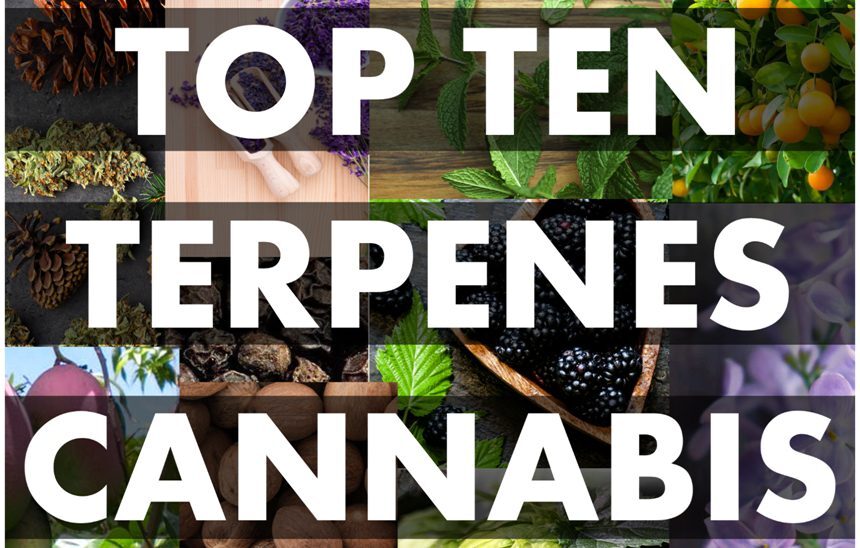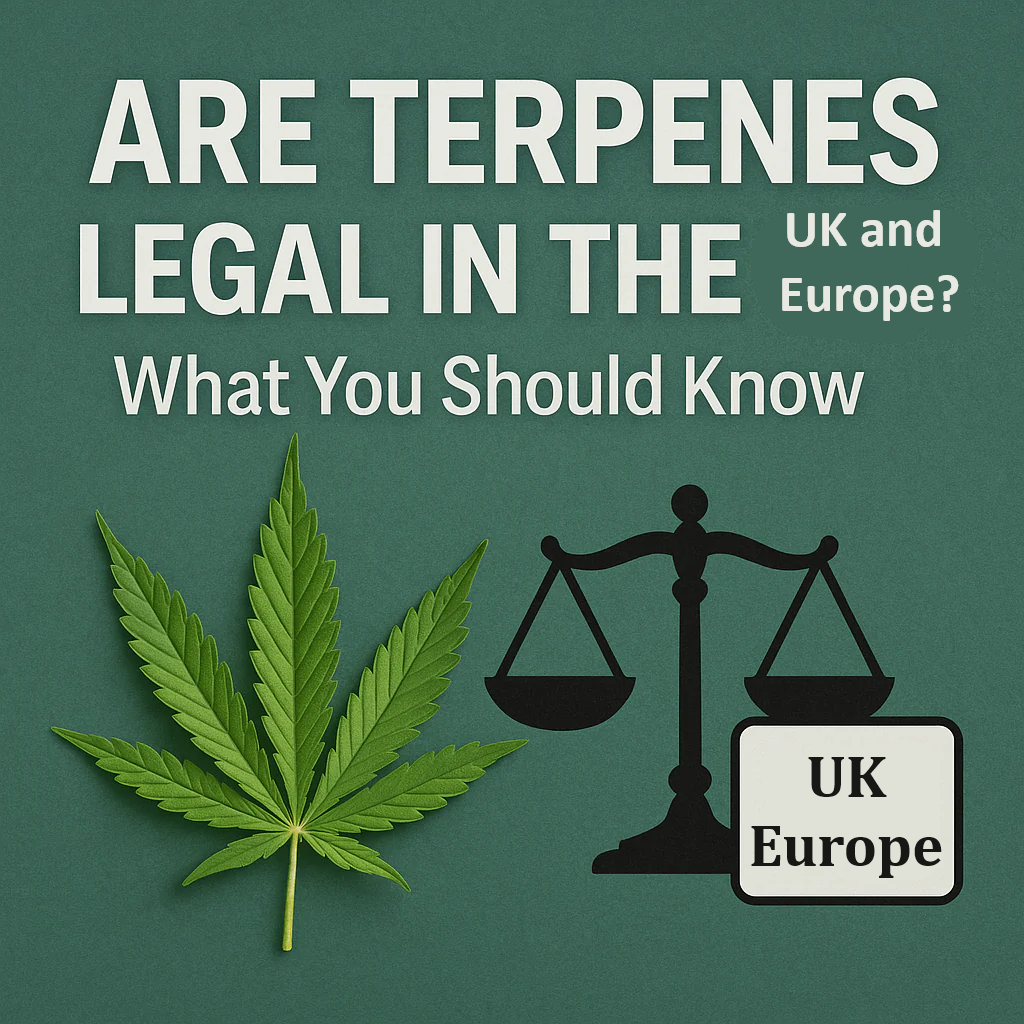“Sustainability and Innovation: The Future of Terpene-Infused Cannabis in Germany”
Table of Contents:
1. Introduction: Why Sustainability Matters in Cannabis
1.1. Environmental Impact of Cannabis Cultivation
1.2. Consumer Demand for Ethical Products
1.3. Regulatory Compliance and Industry Standards
1.4. Long-Term Viability of the Industry
1.5. Germany’s Role as a Global Leader
2. Advances in Terpene-Rich Cannabis Cultivation
2.1. Environmentally Conscious Cultivation Practices
2.2. The Role of Local Agritech and Advanced Breeding Techniques
3. Green Extraction and Processing Techniques
3.1. Modern, Eco-Friendly Extraction Processes
3.2. Retaining Maximum Terpene Integrity
4. Highlighting Innovative German Brands and Research Projects
4.1. Demecan: Pioneering Domestic Cannabis Cultivation
4.2. Cantourage: Revolutionizing Patient Access
4.3. SynBiotic SE: Diversifying Cannabis Products
4.4. Aphria (now part of Tilray): Global Influence with German Roots
4.5. Research Projects: Advancing Cannabis Science
4.6. Sanity Group: Bridging Science and Business
4.7. Cansativa: Building a Sustainable Supply Chain
4.8. Germany’s Reputation for Quality and Precision
4.9. Export Potential and EU-Wide Standards
5. Conclusions and Predictions for Germany’s Green Future
5.1. Sustainability as a Core Value
5.2. Innovation in Terpene-Rich Products
5.3. Germany’s Role in Shaping EU-Wide Standards
5.4. Export Potential and Global Influence
5.5. Predictions for the Future
5.6. A Green Future for Cannabis
1. Introduction: Why Sustainability Matters in Cannabis
The global cannabis industry is undergoing a seismic shift, driven by increasing legalization, consumer demand for high-quality products, and a growing awareness of environmental responsibility. As one of Europe’s most progressive nations, Germany is at the forefront of this transformation, particularly in the realm of terpene-infused cannabis. Terpenes—the aromatic compounds responsible for the unique flavors and therapeutic effects of cannabis—are becoming a focal point for innovation and sustainability in the industry.
Sustainability is no longer a buzzword; it’s a necessity. The cannabis industry, like any other agricultural sector, has a significant environmental footprint. From energy-intensive cultivation practices to chemical-laden extraction methods, the traditional approaches to cannabis production are increasingly at odds with the global push for eco-consciousness. In Germany, however, a new paradigm is emerging—one that harmonizes sustainability with cutting-edge innovation to produce terpene-rich cannabis products that are as good for the planet as they are for consumers.
This blog explores how Germany is pioneering sustainable practices in cannabis cultivation, extraction, and product development, positioning itself as a global leader in the terpene-forward cannabis market. We’ll delve into the latest advancements in environmentally conscious farming, green extraction techniques, and innovative product formats, while also examining Germany’s potential to set EU-wide standards for sustainable cannabis production.

1.1.Environmental Impact of Cannabis Cultivation
Cannabis cultivation, particularly on a large scale, can have a significant environmental impact. Indoor growing operations, which are common in the industry, require substantial energy for lighting, heating, and ventilation. This energy consumption often relies on non-renewable sources, contributing to greenhouse gas emissions. Additionally, water usage, pesticide application, and waste management are critical issues that need to be addressed to reduce the industry’s ecological footprint.
In Germany, where environmental regulations are stringent, cannabis producers must adopt sustainable practices to comply with laws and meet consumer expectations. By investing in energy-efficient technologies, renewable energy sources, and water-saving systems, the industry can reduce its environmental impact while maintaining high-quality production.
1.2. Consumer Demand for Ethical Products
Today’s consumers are more conscious than ever about the environmental and social impact of the products they purchase. This trend is particularly evident in Germany, where sustainability is a key consideration for many buyers. From organic food to eco-friendly clothing, German consumers are willing to pay a premium for products that align with their values.
The cannabis industry is no exception. As the market grows, consumers will increasingly seek out sustainably grown and ethically produced cannabis products. Companies that prioritize sustainability will not only meet this demand but also build brand loyalty and trust among their customers.
1.3. Regulatory Compliance and Industry Standards
Germany’s regulatory framework for cannabis is still evolving, but it is likely to include sustainability requirements as part of its broader environmental goals. By proactively adopting sustainable practices, cannabis businesses can stay ahead of regulatory changes and avoid potential penalties or restrictions.
Moreover, sustainability can help the industry establish itself as a responsible and legitimate sector. By adhering to high environmental and social standards, cannabis companies can counter negative stereotypes and demonstrate their commitment to positive change.
1.4. Long-Term Viability of the Industry
Sustainability is not just about protecting the environment; it’s also about ensuring the longterm viability of the cannabis industry. Climate change, resource scarcity, and environmental degradation pose significant risks to agriculture and production. By embracing sustainable practices, the cannabis industry can mitigate these risks and secure its future.
For example, regenerative agriculture techniques, such as crop rotation and organic farming, can improve soil health and reduce the need for chemical inputs. Similarly, renewable energy systems can lower operational costs and protect businesses from fluctuating energy prices.
1.5. Germany’s Role as a Global Leader
Germany has long been a leader in sustainability, from its Energiewende (energy transition) to its ambitious climate goals. As the cannabis industry grows, Germany has the opportunity to set an example for other countries by integrating sustainability into every aspect of the supply chain.
By fostering innovation and collaboration, Germany can develop best practices for sustainable cannabis cultivation, processing, and distribution. This leadership can inspire other nations to follow suit, creating a global movement toward a more sustainable cannabis industry.
2. Advances in Terpene-Rich Cannabis Cultivation
2.1. Environmentally Conscious Cultivation Practices
German cannabis cultivators are leading the charge in adopting sustainable farming methods that prioritize both environmental health and terpene preservation. Terpenes are highly sensitive compounds that can be easily degraded by harsh growing conditions, making sustainable practices not just an ethical choice but a necessity for producing high-quality cannabis.
· Greenhouse Cultivation:
Greenhouses are becoming the gold standard for sustainable cannabis cultivation in Germany. By controlling temperature, humidity, and light, greenhouse growers can optimize terpene production while minimizing energy consumption. Advanced greenhouse systems often incorporate renewable energy sources, such as solar panels, to further reduce their carbon footprint. Additionally, greenhouses protect crops from extreme weather conditions and pests, reducing the need for chemical interventions.
· Hydroponics and Aquaponics:
Soil-less cultivation methods like hydroponics and aquaponics are gaining traction among German cannabis producers. These systems use significantly less water than traditional soil-based farming and allow for precise nutrient delivery, which enhances terpene expression. Aquaponics, which combines hydroponics with fish farming, creates a closed-loop ecosystem that recycles water and nutrients, making it one of the most sustainable cultivation methods available.
· Organic Pest Control:
Pesticides can harm both the environment and the delicate terpene profiles of cannabis plants. German cultivators are increasingly turning to organic pest control methods, such as introducing beneficial insects (e.g., ladybugs and predatory mites) and using natural repellents like neem oil. These practices not only protect terpenes but also ensure that the final product is free from harmful chemical residues.
2.2. The Role of Local Agritech and Advanced Breeding Techniques
Germany’s robust agritech sector is playing a pivotal role in advancing sustainable cannabis cultivation. From AI-driven monitoring systems to precision agriculture tools, German agritech companies are providing cultivators with the tools they need to maximize terpene production while minimizing environmental impact.
· AI and IoT in Cultivation:
Artificial intelligence (AI) and the Internet of Things (IoT) are revolutionizing cannabis farming. Sensors placed throughout cultivation facilities collect real-time data on environmental conditions, allowing growers to make data-driven decisions that optimize terpene expression. For example, AI algorithms can adjust lighting schedules and nutrient delivery based on the specific needs of each plant, ensuring consistent quality and yield.
· Advanced Breeding Techniques:
German researchers are using advanced breeding techniques, such as marker-assisted selection and CRISPR gene editing, to develop cannabis strains with enhanced terpene profiles. These techniques allow breeders to identify and amplify the genetic traits responsible for specific terpenes, creating strains tailored to consumer preferences and therapeutic needs. By focusing on terpene-rich strains, German cultivators can differentiate themselves in a competitive global market.
3. Green Extraction and Processing Techniques
3.1. Modern, Eco-Friendly Extraction Processes
Once cannabis is harvested, the next challenge is extracting its valuable compounds - cannabinoids and terpenes - without compromising their integrity or harming the environment. Traditional extraction methods often rely on toxic solvents like butane or propane, which can leave behind harmful residues and degrade terpenes. In contrast, German companies are adopting cleaner, more sustainable extraction techniques.
· Supercritical CO₂ Extraction:
Supercritical CO₂ extraction is widely regarded as the gold standard for eco-friendly cannabis extraction. This method uses carbon dioxide under high pressure and temperature to isolate cannabinoids and terpenes without the need for toxic solvents. The result is a pure, high-quality extract that retains the full spectrum of terpenes. Additionally, CO₂ is a byproduct of industrial processes, making it a sustainable choice for extraction.
· Solventless Extraction:
Solventless methods, such as rosin pressing and ice water extraction, are gaining popularity in Germany for their simplicity and environmental benefits. Rosin pressing involves applying heat and pressure to cannabis flowers or hash to extract cannabinoids and terpenes, while ice water extraction uses cold water and agitation to separate trichomes from plant material. Both methods produce clean, terpene-rich extracts without the use of chemicals.
· Closed-Loop Systems:
For companies that still use hydrocarbon extraction (e.g., butane or propane), closedloop systems are a more sustainable alternative. These systems capture and recycle solvents, reducing waste and minimizing environmental impact. While not as ecofriendly as CO₂ or solventless methods, closed-loop systems represent a significant improvement over traditional open-loop extraction.
3.2. Retaining Maximum Terpene Integrity
Terpenes are volatile compounds that can easily be lost or degraded during extraction and processing. German companies are employing innovative techniques to preserve terpene integrity, ensuring that the final product delivers the full sensory and therapeutic benefits of cannabis.
· Low-Temperature Extraction:
Many terpenes are sensitive to heat and can be destroyed at high temperatures. Lowtemperature extraction methods, such as cold ethanol extraction, help preserve these delicate compounds. By keeping temperatures below a certain threshold, extractors can capture a broader spectrum of terpenes and produce a more flavorful and aromatic product.
· Terpene Isolation and Reintroduction:
Some companies are taking terpene preservation a step further by isolating terpenes during extraction and reintroducing them into the final product. This allows for precise control over the terpene profile, enabling the creation of custom formulations tailored to specific consumer needs. For example, a product designed for relaxation might feature high levels of linalool and myrcene, while a product for focus and energy could emphasize limonene and pinene.
4. Highlighting Innovative German Brands and Research Projects
Germany has emerged as a global leader in the cannabis industry, combining cutting-edge research, innovative brands, and a progressive regulatory framework. As one of the first European countries to legalize medical cannabis in 2017, Germany has since become a hub for groundbreaking advancements in cannabis science, technology, and product development. In this blog, we’ll explore some of the most innovative German brands and research projects that are shaping the future of the cannabis industry.
4.1. Demecan: Pioneering Domestic Cannabis Cultivation
Demecan is one of Germany’s first companies to receive a license for domestic cannabis cultivation. Based in Dresden, this innovative brand focuses on producing high-quality, pharmaceutical-grade cannabis to meet the growing demand for medical cannabis in Germany. Demecan’s state-of-the-art cultivation facilities leverage advanced technology to ensure consistency, purity, and sustainability. By producing cannabis locally, Demecan is reducing reliance on imports and setting a new standard for the industry.
4.2. Cantourage: Revolutionizing Patient Access
Cantourage is a Berlin-based company dedicated to improving patient access to medical cannabis. They specialize in developing tailored cannabis-based therapies and have established a robust distribution network to ensure patients receive their medication quickly and reliably. Cantourage also collaborates with healthcare providers to educate them about the benefits of cannabis, helping to break down stigmas and expand treatment options for patients.
4.3. SynBiotic SE: Diversifying Cannabis Products
SynBiotic SE is a Munich-based company that has made waves in the cannabis industry by offering a diverse portfolio of products, including CBD oils, cosmetics, and edibles. Their focus on research and development has allowed them to create innovative formulations that cater to both medical and wellness markets. SynBiotic’s commitment to quality and transparency has earned them a loyal customer base and positioned them as a leader in the European cannabis space.
4.4. Aphria (now part of Tilray): Global Influence with German Roots
Although Aphria is a Canadian company, its German subsidiary, Aphria Deutschland, has played a significant role in shaping the country’s cannabis landscape. Aphria Deutschland was one of the first companies to distribute medical cannabis in Germany and has since expanded its operations to include cultivation, processing, and distribution. Their expertise and global reach have made them a key player in the German market.
4.5. Research Projects: Advancing Cannabis Science
Germany is home to several groundbreaking research projects that are advancing our understanding of cannabis and its potential applications. Here are a few notable initiatives:
• University of Leipzig: Researchers at the University of Leipzig are studying the effects of cannabinoids on chronic pain and neurological disorders. Their work is helping to uncover new therapeutic uses for cannabis and improve treatment protocols for patients.
• Fraunhofer Institute: The Fraunhofer Institute, a leading research organization, is exploring the use of cannabis in industrial applications, such as biofuels and bioplastics. Their work highlights the versatility of the cannabis plant and its potential to contribute to a more sustainable future.
• Charité – Universitätsmedizin Berlin: Charité, one of Europe’s largest university hospitals, is conducting clinical trials to evaluate the efficacy of cannabis in treating conditions like multiple sclerosis, epilepsy, and chemotherapy-induced nausea. Their research is providing valuable insights into the safety and effectiveness of cannabisbased therapies.
4.6. Sanity Group: Bridging Science and Business
Sanity Group is a Berlin-based company that focuses on developing and distributing cannabisbased medical products. They work closely with researchers and healthcare professionals to ensure their products meet the highest standards of quality and efficacy. Sanity Group’s innovative approach has made them a key player in the German cannabis market, and they continue to push the boundaries of what’s possible in the industry.
4.7. Cansativa: Building a Sustainable Supply Chain
Cansativa is a Frankfurt-based company that operates one of the largest cannabis distribution platforms in Germany. They are committed to building a sustainable and transparent supply chain, ensuring that patients have access to safe and reliable cannabis products. Cansativa also works with regulators to shape policies that support the growth of the cannabis industry while prioritizing patient safety.
4.8. Germany’s Reputation for Quality and Precision
Germany’s reputation for precision engineering and high-quality manufacturing extends to its cannabis industry. The country’s strict regulatory framework ensures that cannabis products meet rigorous standards for safety and quality, giving German brands a competitive edge in the global market. This commitment to excellence, combined with a focus on sustainability, positions Germany as a leader in the terpene-forward cannabis sector.
4.9. Export Potential and EU-Wide Standards
As the largest economy in the European Union, Germany has the potential to become a major exporter of terpene-rich cannabis products. The country’s advanced infrastructure and expertise in sustainable agriculture make it well-suited to meet the growing demand for high-quality cannabis in Europe and beyond. Additionally, Germany’s leadership in setting EU-wide standards for sustainable cannabis production could help elevate the entire industry, promoting best practices and ensuring consistency across borders.
5. Conclusions and Predictions for Germany’s Green Future
The future of terpene-infused cannabis in Germany is bright, driven by a commitment to sustainability and innovation. As German cultivators, extractors, and brands continue to push the boundaries of what’s possible, they are not only creating high-quality products but also setting a new standard for the global cannabis industry. By prioritizing environmentally conscious practices, preserving terpene integrity, and developing innovative product formats, Germany is poised to become a global leader in the terpene-forward cannabis market.
Looking ahead, we can expect to see even greater advancements in sustainable cultivation and extraction techniques, as well as the emergence of new terpene-based products tailored to specific health and wellness needs. With its reputation for quality and precision, Germany has the potential to shape the future of the cannabis industry, both in Europe and around the world. As consumers increasingly demand products that are both effective and eco-friendly, Germany’s green future in cannabis looks set to thrive.
5.1. Sustainability as a Core Value
Germany’s commitment to sustainability is deeply ingrained in its cannabis industry. From energy-efficient cultivation practices to eco-friendly extraction methods, German producers are proving that high-quality cannabis can be produced with minimal environmental impact. The adoption of greenhouse cultivation, hydroponics, and renewable energy sources has significantly reduced the carbon footprint of cannabis farming. Additionally, the use of organic pest control and regenerative agriculture techniques ensures that the industry is not only sustainable but also beneficial to the ecosystem.
As climate change and resource scarcity become increasingly pressing issues, the cannabis industry must prioritize sustainability to ensure its long-term viability. Germany’s leadership in this area demonstrates that it is possible to balance profitability with environmental responsibility, setting an example for other countries to follow.
5.2. Innovation in Terpene-Rich Products
Terpenes, the aromatic compounds that give cannabis its unique flavors and therapeutic effects, are at the heart of Germany’s cannabis innovation. Advances in cultivation and extraction techniques have enabled German producers to preserve and enhance terpene profiles, creating products that deliver a superior sensory and therapeutic experience. From low-temperature extraction methods to terpene isolation and reintroduction, German companies are pushing the boundaries of what’s possible in cannabis product development.
Looking ahead, we can expect to see even more innovative terpene-based products tailored to specific health and wellness needs. Whether it’s a strain designed for relaxation, focus, or pain relief, German producers are leveraging their expertise in terpene science to meet the diverse demands of consumers.
5.3. Germany’s Role in Shaping EU-Wide Standards
As the largest economy in the European Union, Germany has the potential to set EU-wide standards for sustainable cannabis production. The country’s strict regulatory framework, combined with its reputation for quality and precision, positions it as a leader in the global cannabis market. By establishing best practices for cultivation, extraction, and distribution, Germany can help elevate the entire industry, ensuring that cannabis products across Europe meet high standards of safety, quality, and sustainability.
Germany’s leadership in this area could also pave the way for greater international collaboration. By sharing its knowledge and expertise, Germany can help other countries develop sustainable cannabis industries, creating a global movement toward more eco-conscious practices.
5.4. Export Potential and Global Influence
Germany’s advanced infrastructure, skilled workforce, and commitment to sustainability make it well-suited to become a major exporter of terpene-rich cannabis products. As demand for highquality cannabis grows in Europe and beyond, German producers are poised to capitalize on this opportunity. By exporting not only products but also sustainable practices and technologies, Germany can extend its influence on the global cannabis industry.
Moreover, Germany’s focus on sustainability aligns with the values of modern consumers, who are increasingly seeking products that are both effective and environmentally friendly. This gives German cannabis brands a competitive edge in the global market, as they can appeal to a growing segment of eco-conscious consumers.
5.5. Predictions for the Future
· Increased Adoption of Renewable Energy: As energy costs rise and environmental concerns grow, more cannabis producers will turn to renewable energy sources like solar and wind power to reduce their carbon footprint.
· Expansion of Terpene-Based Products: The demand for terpene-rich cannabis products will continue to grow, driving innovation in cultivation and extraction techniques. We can expect to see a wider variety of terpene-focused products, including edibles, topicals, and beverages.
· Stronger Regulatory Frameworks: Germany’s leadership in sustainable cannabis production will likely influence EU-wide regulations, leading to stricter standards for environmental and social responsibility across the industry.
· Greater Consumer Awareness: As consumers become more educated about the environmental impact of cannabis production, they will increasingly seek out brands that prioritize sustainability. This will drive further innovation and competition in the market.
· Global Collaboration: Germany’s expertise in sustainable cannabis production will foster international partnerships, helping other countries develop eco-friendly cannabis industries and promoting global best practices.
5.6. A Green Future for Cannabis
Germany’s green future in cannabis is not just a vision—it’s a reality that is already taking shape. By combining sustainability with innovation, German producers are creating a model for the global cannabis industry that prioritizes both environmental health and consumer satisfaction. As the industry continues to evolve, Germany’s leadership will play a crucial role in shaping a more sustainable, ethical, and high-quality cannabis market.
In conclusion, Germany’s cannabis industry is a testament to what can be achieved when innovation meets responsibility. By staying true to its values of sustainability and quality, Germany is not only securing its own future in cannabis but also inspiring a greener, more sustainable future for the entire world. The lessons learned in Germany will undoubtedly influence the global cannabis landscape, proving that a thriving industry can coexist with a thriving planet.

Where to Buy Terpenes and Cannabis Products in Germany:
Here you can find terpenes and cannabis products available in Germany (Kaufen Terpene Deutschland).
For readers looking for scientifically-validated information about terpenes and cannabis:
- Project CBD: Terpenes Guide – Comprehensive scientific overview of terpenes and their effects.
- National Center for Biotechnology Information (NCBI) – Study on terpenes' pharmacological potential.
- Frontiers in Plant Science: Cannabis Terpenes – Research on terpene biosynthesis in cannabis.
-
What are cannabis terpenes? (Was sind Cannabis-Terpene?) – Learn more at Leafly: Terpenes Explained.
-
Benefits of terpenes in cannabis (Vorteile von Terpenen in Cannabis) – See research: NCBI: Terpenes and the "Entourage Effect".
References:
1. Mills, E. (2012). The Carbon Footprint of Indoor Cannabis Production. Energy Policy, 46, 58-67.
2. German Federal Institute for Drugs and Medical Devices (BfArM). (2023). Medical Cannabis Regulations in Germany. Official BfArM Site.
3. Chandra, S., et al. (2017). Cannabis Cultivation: Methodologies for Achieving High-Quality Production. Frontiers in Plant Science, 8, 2086.
4. Perrotin-Brunel, H., et al. (2011). Supercritical CO₂ Extraction of Cannabinoids from Cannabis sativa L. Journal of Supercritical Fluids, 58(1), 6-12.
5. Rosenthal, E. (2018). Beyond Buds: Next Generation. Ed Rosenthal.





